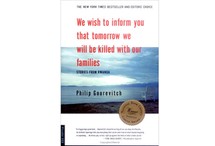We Wish to Inform You That Tomorrow We Will Be Killed with Our Families
By Philip Gourevitch
355 pages;
Macmillan
This is an extraordinary account of a Western journalist trying to find answers in Rwanda in the years following the genocide. Yearning, peripatetic, and deeply accessible, it gave me an entrée into this monstrous event.
Gourevitch finds a very human path through the wreckage of an inhuman event. Riding in his wake, I felt as though I started to know a place I had never been. As soon as I finished the last page, I wanted to know more.
I sought out Samantha Power's book A Problem from Hell—the section on Rwanda astonished me by rigorously detailing how Western powers failed to stop the genocide, sometimes deliberately. From there, I moved to Roméo Dallaire's book Shake Hands with the Devil, a first-person account of the political machinations in prelude to the genocide and the environment on the ground when it happened (as well as a brutally honest self-flagellation for what he believes are his own failings). Dallaire demonstrates what few in the West completely understood—that the genocide was not merely an African tribal eruption but was designed, planned, and orchestrated over a long period of time by a loose confederacy of politicians and military and private actors who stood to gain by it. Finally, I found Jean Hatzfeld's Life Laid Bare and Machete Season, interviews with genocide survivors and perpetrators, respectively.
Beyond these, I read innumerable books by survivors whose intimate stories led me to a broader study of Africa's Great Lakes region. Eventually, I found myself traveling to Rwanda, Uganda, South Sudan, and Congo—to hospitals, orphanages, displaced person camps, child soldier reintegration facilities. I had a desire to learn and to help, even if only a little, a place that had been racked with pain and war—a place I never would have known about without these authors.
— Ben Affleck


